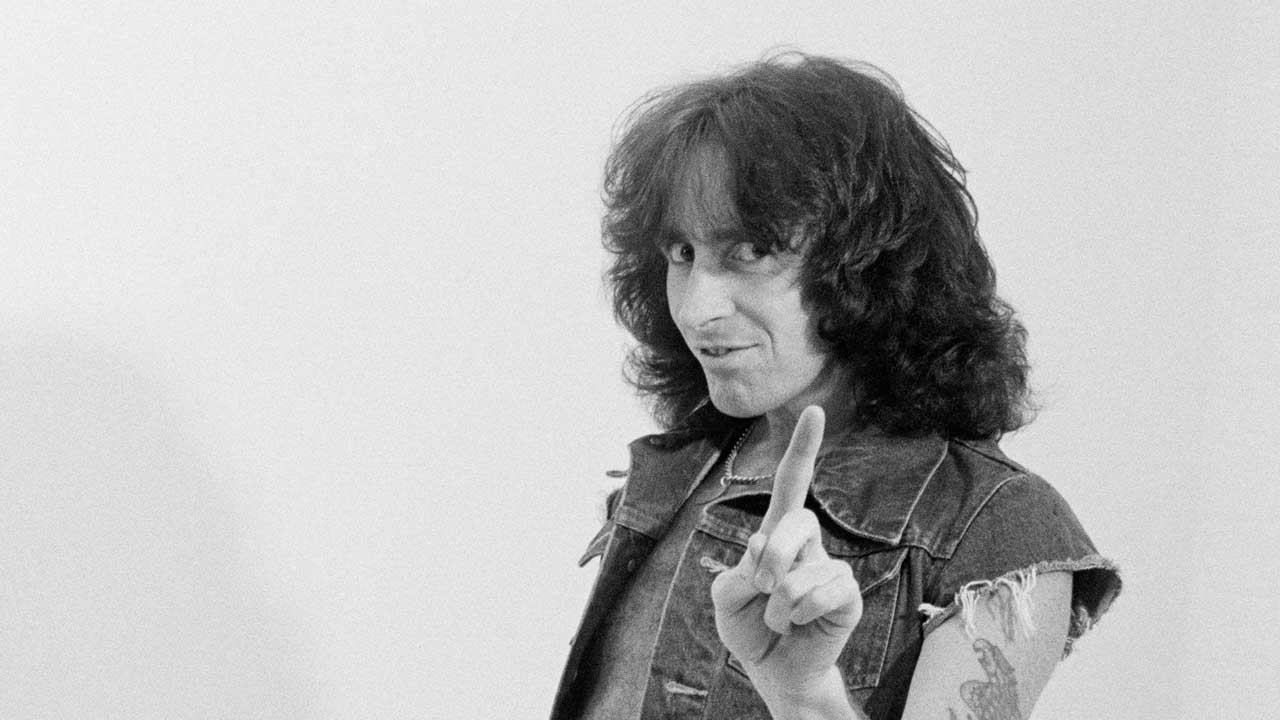
In 2005, Classic Rock's Geoff Barton explored the mysteries surrounding the death of AC/DC frontman Bon Scott in frontman, speaking to those who'd spent time with the singer in the days and hours leading up to his death. These interviewees included UFO's Pete Way and Paul Chapman, who have both since passed on. Geoff's original feature is published below.
A dozen years later, AC/DC biographer Jess Fink tracked down some more key figures to try to piece together what happened that fateful night. The resultant book, The Last Highway: The Untold Story Of Bon Scott's Death, was excerpted in Classic Rock in November 2017.
It’s an overcast day in early December 2004, and Classic Rock is making its way to a fateful setting: number 67 Overhill Road, in East Dulwich, South London. This is where AC/DC's Bon Scott died, his body found abandoned in a Renault 5 car parked on the road just outside the address nearly 25 years ago.
We don’t plan to rubberneck the scene like a bunch of sickos ogling a motorway pile-up, we just felt that we had to check it out before we began to write this story. You can call us morbid if you like; we’ll just call it research.
It takes a while to get to East Dulwich from the centre of the city. You ride the Victoria-line tube to Brixton and hop on the single-decker P4 bus. You rumble through posh Dulwich Village, and the best part of half an hour later you alight outside the grim tenements of the Lordship Lane high-rise council estate.
You walk a little way up the street, turn left by the Harvester pub, and Overhill Road is the second turning on the right. The first thing you notice is a tatty building on the corner called the Rockbank Hotel, and you can’t help but raise a wry smile.
Number 67 is at the top of steep gradient. And it ain’t a pretty sight. It’s a dour, featureless block of flats penned in by ranks of bright-green wheelie bins. It could have been transplanted here direct from the Eastern bloc.
There’s a graffiti’d old ambulance parked directly outside the flats, which wipes that grin off your face straight away. To compound the irony, there’s even a Renault behind it (although admittedly it’s a Mégane, not a 5).
The trees that line Overhill Road are bare of leaves, but number 67’s front garden is a thriving jungle of roots, weeds and hawthorns. There’s litter all over the place. There’s a wheelbarrow in the corner that had once been full of white paint, but which is now all dried-out and crusty.
The only evidence of anything remotely rock’n’roll-related is a skateboard propped up in the porch of the house next door. Of Bon Scott’s heritage, there is not a sign.
But hang on a second… There’s a scratchy silver plaque attached to the front of number 67. Tiptoe up the path, look closely, and you can see a handful of scribbled tributes grouped around the legend ‘Flats 1-6’. The messages have been written in obvious haste:
‘To Bon, from Björn in Sweden’; ‘AC-Foxi-DC’; ‘Ronald and Frank from Germany – cheers’; ‘To Bon, Szmery from Poland.’
And that’s it. Nothing else, apart from the drone of an aircraft; the distant sound of schoolchildren playing; brambles rustling dryly.
Overhill Road must have changed substantially since 1980, the year of Bon’s death. Opposite number 67 is a big new apartment block called Dawson Heights that plainly wasn’t around two and a half decades ago.
The proprietor of a nearby Londis store has been in the country for only three months. He expresses surprise when he hears that a top rock star popped his clogs just down the road. The shopkeeper says he doesn’t know of any local residents who would have been on the scene so many years ago.
A tradesman unloading a white van shrugs; he’s only making a delivery, and he actually comes from Bromley. He’s heard of AC/DC, but not of Bon Scott.
There’s no reply from pressing any of the door buzzers stuck on number 67’s front wall, just the empty hiss of the intercom, like static from a badly tuned radio.
You turn on your heels with an air of resignation and trudge back down the hill. Fine rain fills the air. As you grapple with your umbrella, you notice the silhouette of a bright-yellow dog stencilled on to the pavement. It’s accompanied by a warning to owners not to allow their pets to shit on the pavement: Bag It & Bin It.
Try as you might, you can’t prevent that wry smile returning to your lips: Bag It & Bin It? It sounds like a bleedin’ Bon Scott song title.

Ronald Belford Scott was born on July 9, 1946, in Kirriemuir, Scotland. He emigrated with his family to Australia in 1952. He left school at age 15, and held a variety of part-time jobs before deciding to ply his trade in music; as a drummer-cum-vocalist, he enjoyed limited success before a motorcycle accident cut short his ambitions.
Once recovered, Bon took a job driving a stomping little outfit called AC/DC around: down the streets of Melbourne, across tumbleweed trails, along desert roads and beyond. But Bon always hankered to be a solid-gold-proper AC/DC band member, not a humble roadie.
Tempering his bright-eyed braggadocio somewhat, he charmed his way into the group’s affections and eventually achieved his aim, joining AC/DC as singer in late September 1974, replacing the glam rockin’ Dave Evans.
AC/DC’s brand new frontman made an immediate impact. Bon Scott was TNT.
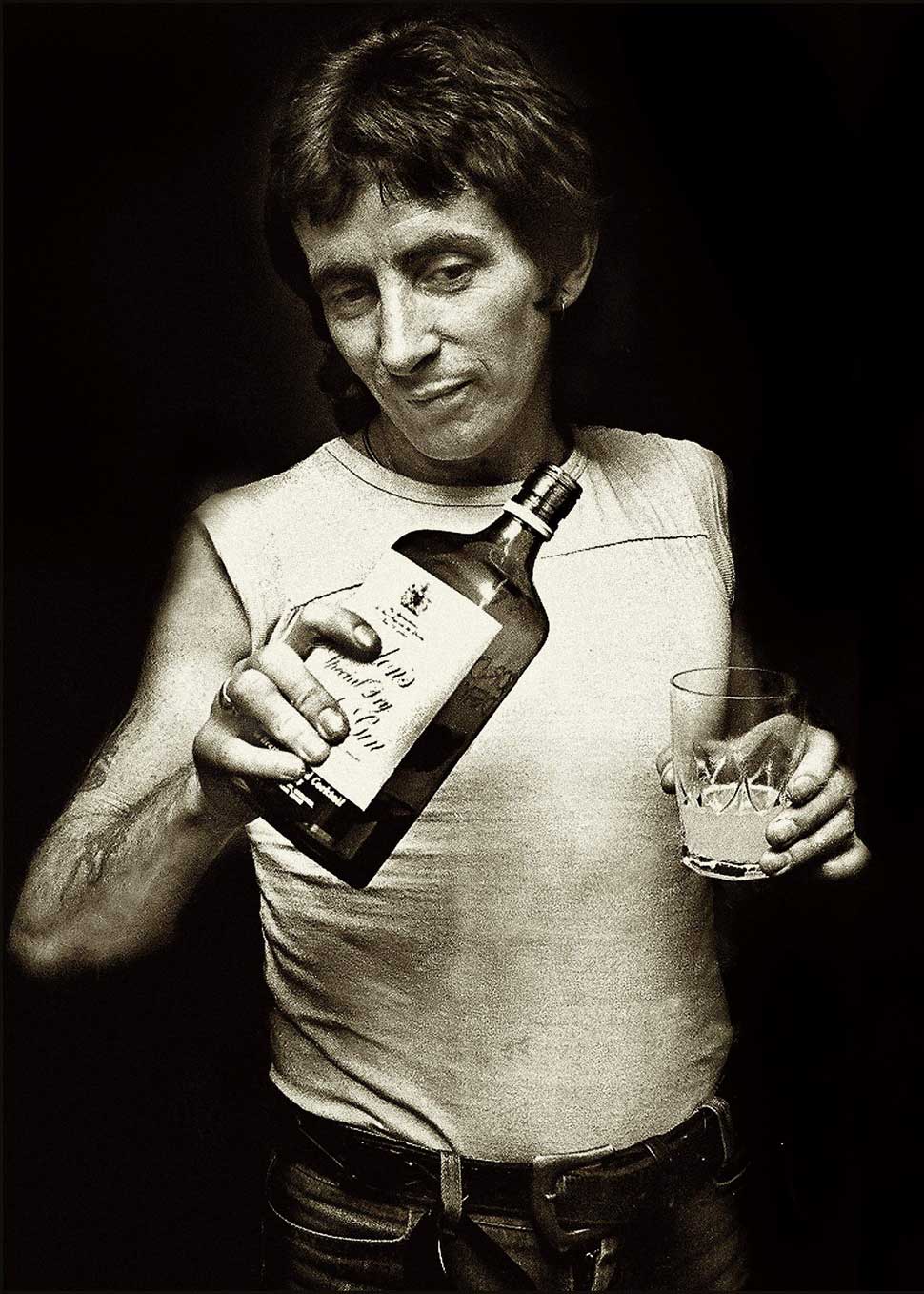
Bon was only in AC/DC for a little over five years; he died at age 33 on February 19, 1980. Nevertheless, this bare-chested, black-haired, garrulous’n’glowering, lewd’n’lascivious larrikin was justifiably named the greatest rock frontman of all time in Classic Rock No.68. "Bon had a riveting presence," we wrote. "He was cocky but he wasn’t conceited. He was vulgar but he wasn’t boorish. He was tough as nails but with a soft white underbelly. He was a hero, an icon, but he was also the guy next door, lying underneath a greasy motorbike with a spanner in his hand."
But don’t just take our word for it. Even today Bon is fondly remembered by many of his peers. “I knew Bon for many, many years,” Jimmy Barnes, former frontman with Oz rockers Cold Chisel, told Classic Rock. “He was a good mate of mine. When I was about 15 I used to go and see him in Fraternity [one of Bon’s pre-AC/DC outfits], who were a great rock’n’roll band. Then he had that motorbike accident that took him off the scene for a while. And when he recovered he went off to join AC/DC. I then took his place in Fraternity – which was one of the sharpest learning curves of my life. I owe a lot to Bon."
“What a lot of people don’t realise,” Barnes adds, “is that he was an R&B singer. His favourite singer was Sam Moore [of Sam & Dave]; their tones were very similar. To me, Bon brought something to AC/DC that they’ve lacked since his death – that tongue-in-cheek humour. You could never tell whether he was laughing with you, or at you. The chemistry between him and the Young brothers [guitarists Angus and Malcolm] was as good as Keith Richards and Mick Jagger… anyone, y’know? They were as menacing and as funny as anything I ever saw. And I used to see it regularly in small clubs in Australia.”
Angry Anderson, the aggressive, shaven-headed singer with Australia’s legendary Rose Tattoo, endorses Barnes’s comments: “Bon was a gypsy, a vagabond, a buccaneer, a bad boy and a rock’n’roll outlaw. He was truly a street poet, documenting in lyric and performance all that he thought, felt and cared about life. He was the only other singer I ever invited to sing with the Tatts – whenever he felt like it.”
This writer first met Bon Scott in May 1976. Sounds music weekly had taken the unprecedented step of sponsoring a fully-fledged British tour by an obscure band called AC/DC. The down under-based group’s UK schedule was a 19-dater that kicked off on June 11, ’76 at Glasgow City Hall, and climaxed at London’s Lyceum Ballroom (nowadays better known for housing the stage production of Disney’s The Lion King) on July 7. It was very a bold move for Sounds to lend its support to such an unknown band.
“I remember being invited by Atlantic [then AC/DC’s record label] to see a film – they weren’t called videos then – of Angus and friends taken in Australia,” remembers Alan Lewis, who was Editor of Sounds at the time. “And I was so blown away that it seemed like a no-brainer – that term wasn’t around then either! – to get behind them.”
Before the so-called Sounds-AC/DC ‘Lock Up Your Daughters Summer Tour’ started, I was invited to a low-key club gig the band had arranged at the Retford Porterhouse, just outside Nottingham. Prior to that show, I had also been to see AC/DC at London’s Marquee (in those days in Wardour Street). "If your face doesn’t break out into an epidemic of smiles during the opening bars of the band’s set, you must be a manic depressive," ran the enthusiastic report.
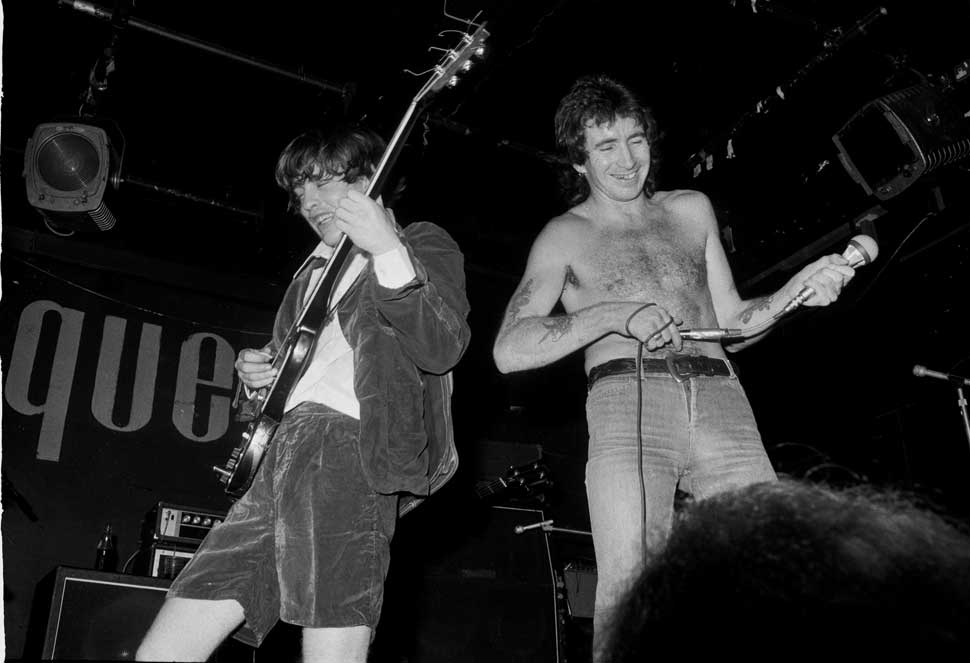
Returning home from Retford in the back of AC/DC’s van, my abiding memory is of a booze-sodden Bon Scott falling asleep on the rickety seat alongside me, cradling an empty brandy bottle lovingly in his arms.
By the time we got back to AC/DC’s rented house in Barnes, west London, as dawn was breaking, Bon was rousing from his stupor; his cheeky flashing eyes were beginning to become alive and alert once more.
But less than four years later, sozzled out of his brain while on board an entirely different vehicle, Bon would fall asleep and never wake up again.
Almost 25 years after Bon Scott’s death, there are still many unexplained events that surround it.
The story that everyone knows is this: after spending Christmas 1979 in Australia, Bon was in London in the New Year, working up songs for the next AC/DC studio album, the follow-up to Highway To Hell. He was living in a flat in Ashley Court, Victoria, London, with his new Japanese girlfriend, Anna Baba. Also in the frame was Bon’s former girlfriend, Australian Margaret ‘Silver’ Smith, a renowned heroin user and dealer who was a familiar figure in London’s then thriving rock’n’roll scene.
Author Clinton Walker relates the following story in his biography Highway To Hell: The Life & Times Of AC/DC Legend Bon Scott: on Monday evening, February 18, 1980, Bon phoned Silver Smith to invite her along to see a band at Dingwalls in Camden, north London. Silver declined, but said she had a friend – Alistair (sometimes spelled Alasdair) Kinnear – who would be delighted to accompany him. In the end, Bon and Kinnear ended up at the Music Machine, a venue just down the road from Dingwalls at the bottom end of Camden High Street, near Mornington Crescent Tube station.
Two days later, following Bon’s sudden death, Kinnear was quoted in the Wednesday, February 20 edition of London’s Evening Standard: “I met up with Bon to go to the Music Machine, but he was pretty drunk when I picked him up. When we got there, he was drinking four whiskies straight in a glass at a time.”
Events begin to get rather hazy from here on in. The oft-repeated version is that Kinnear drove Bon back to the singer’s flat in Victoria, but a boozed-up Scott had passed out in the car in the meantime, and apparently could not be stirred. So Kinnear then made a diversion to East Dulwich, where he lived in a flat at number 67 Overhill Road. Kinnear parked his car – a tiny, French-built supermini – outside his home, but Bon remained unconscious. He simply couldn’t be shifted.
“I just could not move him,” Kinnear told London evening newspaper the Standard, “so I covered him with a blanket and left him a note to tell him how to get up to my flat in case he woke up.”
Kinnear says he went to bed in the early hours of Tuesday, February 19, and that he didn’t wake until the following evening. “I went to sleep and it was later in the evening [reportedly at 7.45pm] when I went back out to the car, and I knew something was wrong immediately.”
Inside Kinnear’s car, Bon Scott lay dead. "He could not find a comfortable position in the small car," Clinton Walker recounts in his book. "His body was curled around the gearstick, his neck twisted, his dental plate dislodged. The bile rose up in his throat and blocked his asthmatic windpipe."
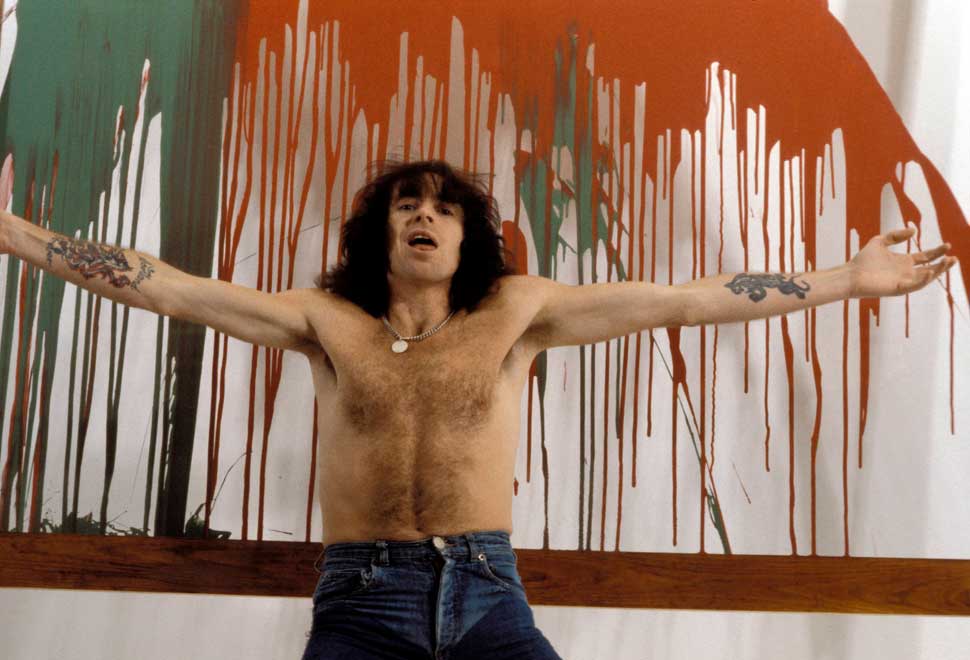
Bon’s body was taken to nearby King’s College Hospital. The coroner concluded that the vocalist had died due to acute alcoholic poisoning. There was no mention of drugs being involved.
Kinnear – allegedly a would-be musician; apparently a bass player – disappeared a couple of days later, and his flat in East Dulwich was ransacked by persons unknown. Kinnear has never been heard of since.
Much has been made of the British heavy rock band UFO’s role in the events leading up to Bon’s death. Indeed some reports suggest that on the evening he died Bon had intended to meet up with the band’s vocalist Phil Mogg and bassist Pete Way at the Music Machine in Camden. This writer even remembers AC/DC’s manager at the time, Peter Mensch, going so far as to criticise UFO’s party-hard lifestyle and bemoan the negative influence it had on Bon.
Classic Rock recently spoke extensively to Pete Way and ex-UFO guitarist Paul Chapman to get their take on Bon’s death. Chapman, for one, has an intriguing tale to tell – and one that clashes with Scott biographer Walker’s version of the tragic events. Indeed the UFO pair’s memories differ substantially from many previously published reports. And while it should be remembered that both Way and Chapman were heroin users in the early 80s, and that their testimonies may be unreliable, their recollections – to Classic Rock at least – sound at least as credible as any others.
We should mention here that it’s unlikely that Way and Chapman have spoken recently to correlate, or collaborate on, their stories. Way knew that we wanted talk to him about Bon Scott; Chapman didn’t; we merely requested the latter’s assistance on a ‘project’ we were working on.
The two fell out during the recording of Back From The Dead, the recently released comeback album from Pete Way’s band Waysted. Chapman, who is based in the US, contributed guitar parts for the album and sent them over to England. But Way rejected them, claiming they weren’t good enough. Unknown guitarist Chris George was brought in to play on Waysted’s album instead of Chapman.
Classic Rock met up with Way at Waysted singer Fin Muir’s flat in Milton Keynes. We had arranged the meeting because we remembered the famous photograph, taken by Ross Halfin, of Way posing with Bon Scott backstage at a UFO gig at Hammersmith Odeon (now Apollo) in February 1980. This was the last photo taken of Bon before his death, and Way has vivid memories of it: “Yes, you’re right, that was me with Bon. He was hanging out backstage; he was a mate.”
Way told us about when he first encountered AC/DC: “It was when they played the Marquee. I went as a fan, cos I am an AC/DC fan. I had heard Livewire, I think it was, and I thought: ‘I love this’. I went down and became friendly with them.”
Later, UFO and AC/DC spent several months touring in the US together. “They were supporting us. They were special guests; that’s before they’d broken through,” Way recollects. “There was us two and Foreigner. That was a good one. AC/DC hated Foreigner, because they’d do everything to make us not go down well!”
Way was mightily impressed by Bon Scott as a frontman: “He was fantastic,” he gasps. “Do you know who Bon reminds me of? Alex Harvey. I’m a big fan of Alex Harvey – Faith Healer and that. It’s the same thing; Bon had the same attitude. Sensational. Maybe in a movie you can create a Bon, but you can’t create a Bon in real life. Bon created himself.”
Way fondly remembers Bon as “A really nice person. A very nice person. Had a drink, got drunk, went and played, sung better than anybody. [It was] the AC/DC attitude, and Bon was perfect for them. There was no: ‘Oh, I think I’m going to see if I can do a harmony here’, it was like: ‘This is the way we are’. It hit you in the face like a truck, because it was something better than anything else. It was something so special – people with their own minds, [who had made] their own decisions about music, and had their own principles.
“AC/DC wrote the law about playing rock’n’roll. As simple as that. And Bon was brilliant. You’d see him first thing in the morning, and he’d been with the barmaid or something, and he’d go: ‘Had a good workout last night’. He’d get out of the elevator, he’d clap his hands and he’d say: ‘Large Jack Daniel’s.’ Brilliant.”
Unprompted, Way brings up the subject of Bon Scott’s death: “I’m still alive, Bon isn’t. I’m not saying his lifestyle should be endorsed or recommended, but you have to say that certain people lived in a different world, or created a different world. You write movies about people like Bon Scott.”
Bon’s demise, Way says, affected him badly: “It hit me hard. And it’s funny, it took his death to wake the world to AC/DC. It was like, something special. Punk rock almost made it, but AC/DC made it to the max. Bon launched AC/DC’s career into stardom. You can’t buy a Bon Scott. But you know, when we were on tour in the US with them, every night I watched Angus and Bon I thought, wow! It was like a hurricane. It was much better than UFO, and we had to go on and follow it.”
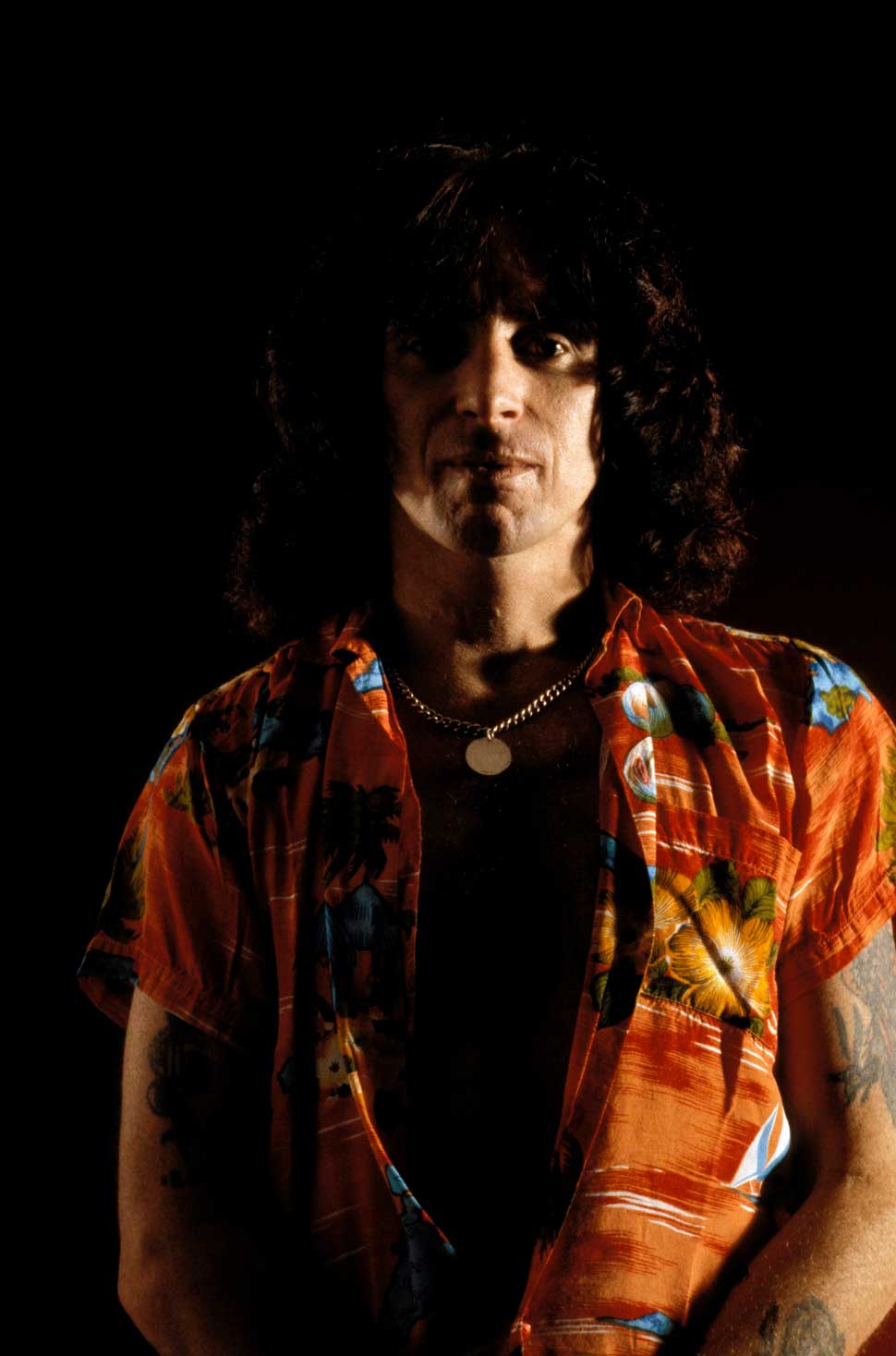
We return to memories of that photograph of Way and Bon backstage at Hammersmith Odeon in February 1980. Way continues: “Now we as UFO were on substances, right? We were using heroin after the show. I’ve got to be very careful here. One of the guys that was bringing it to us was Australian, and he came down with Bon. And, you know, if you do cocaine and drink you can get a violent reaction. But if you’ve never done heroin before – and we were doing heroin after the show like we always did – and you drink, the odds are that at some point you’ll fall asleep, and you’ll choke and you’ll die.”
Rania Habal, MD, of the Society For Academic Emergency Medicine, places Way’s comments into context: “Alcohol is a very common co-ingestant in heroin overdoses,” he comments. “Additionally, a fatal heroin overdose is nearly always caused by respiratory arrest.”
So, Way remembers Bon hanging out with a heroin dealer at that time. Would he go so far as to say that Scott was doing smack backstage with UFO? “I don’t really know,” Way shrugs, “but you generally know the symptoms. Cos we were doing smack and Bon was there… and he drank a lot. But, you know, a lot of people drink a lot, but they drink and throw up and live to tell the tale.”
Who was the Australian guy who arrived with Bon? “Joe Silver or whoever it was.” [Way is getting confused here: this name is an amalgam of Joe Bloe/Joe King and Silver Smith; see Paul Chapman interview later in this story.] “Well, he had different names. Lots of different names. Look, some people sell drugs; you can’t make judgements against them… He was a nice guy. Like, if someone dies in a car crash because they’ve got drunk in a bar, you can’t blame the barman. Just because somebody has cocaine or heroin or something like that and brings it down to your friends… You can’t point a finger at anybody if they’re living a life of excess. And unfortunately I think what probably happened… If you’re not skilled at the art of heroin, then you do dance with the Devil…
“But what a beautiful guy, what a great songwriter Bon was… As I say, it was like Alex Harvey, some of Bon’s stuff, the tongue-in-cheek thing. He was a real personality.”
Classic Rock tries to pin Way down and to get him to offer his precise memories of Bon’s death. As we do so, Paul Chapman’s name is mentioned for the first time.
“I got a phone call,” Way recounts. “Paul Chapman [then UFO’s guitarist] called me. "He said: ‘Pete, Bon’s just died. The people – the police or whoever – need to tell the band.’ I’ve got Angus and Malcolm’s home numbers. So I thought, don’t let Angus know; Malcolm’s the person to tell first. So I gave Paul Chapman Malcolm’s number. I got on quite well with them, so I had the numbers of where they were in London. And I really didn’t want to [give the number to Chapman], because it’s quite early in the morning when I got the phone call.”
Here’s where the popularly accepted version of the Bon Scott story takes a major detour. To recap: Alistair Kinnear said he discovered Bon’s body in his car at 7.45 in the evening on Tuesday, February 19. Pete Way says that he was informed about Bon’s death on the Tuesday morning. So, what happened? How did Paul Chapman know so early that Bon had died?
Way: “Well… [coughs] you know… [voice tapers off]. But, you know, some people do fall asleep and choke in the car. Paul will probably… I’ve got to be very careful here again. Paul’s one of them people who can have as many drinks as you like, and he’ll do as many drugs as you like. Remember, we used to call him Tonka. But yeah, he was actually the one who called me early in the morning to say: ‘Can you get me one of the band’s numbers, because Bon’s dead’. So I probably knew before anybody. But I don’t know the actual situation.”
Way adds: “With Bon there were no limits, so really and truly you don’t know, do you? It can happen to any of us. These days I’m older and perhaps wiser, because I’ll have a few drinks or whatever, and one night I might do a bit of coke. But at least I’m older and wiser; sometimes you’re young and you ain’t that wise.”
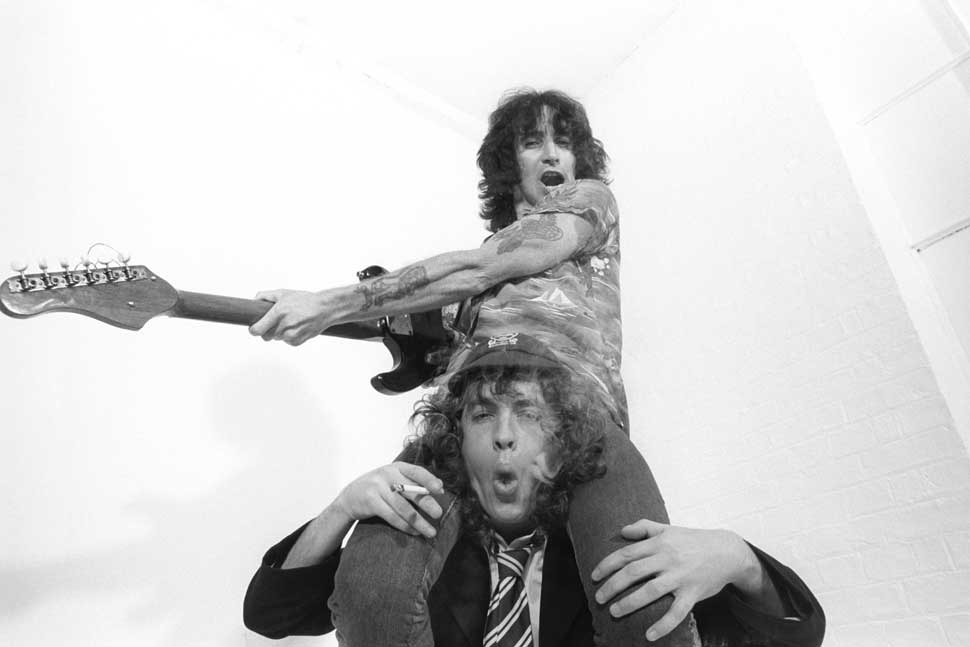
A week after our conversation with Pete Way, Classic Rock tracked down former UFO guitarist Paul Chapman at his home in Florida. Classic Rock knows the Wales-born musician from way back, having first met him when he played guitar in 70s rockers Lone Star. Chapman is still angry about having his guitar work deleted from Waysted’s aforementioned new album, Back From The Dead. On his website he has even posted soundbites of his original work for the album, claiming it was rejected for no good reason. So, plainly, there is no love lost between Paul Chapman and Pete Way. Nevertheless, Chapman’s recollections of Bon Scott’s death follow on seamlessly from Way’s.
Chapman is convinced that he was one of the last people to have seen Bon alive. Bon’s biographer, Clinton Walker, admitted he never interviewed Chapman for his book, explaining why the full account has never emerged until now: “I never spoke to Chapman,” Walker told Classic Rock, “but in the interviews with him I’ve read he sheds no light, and I even doubt his claims of closeness. Therefore I was content to speak to the people who saw Bon on that very last day: his then girlfriend [Anna Baba], his old girlfriend [Silver Smith] and ‘Alistair Kinnear’.” (The quotes around ‘Alistair Kinnear’ are Walker’s own.)
Be that as it may. Classic Rock asked Chapman straight out about his early-morning phone call to Pete Way and his request for the phone numbers of Angus and Malcolm Young so they could be informed of Bon’s death. As we say, if the timing is accurate, then Chapman would have made his call several hours before Alistair Kinnear’s ‘discovery’ of Bon’s body in the Renault 5 outside the flat in East Dulwich in the evening of Tuesday, February 19, 1980.
“I’ll tell you exactly what went down,” Chapman responds eagerly. “We [UFO] were playing at Hammersmith. And Bon arrived; it was on the second or the third of our nights there. The guy who was with Bon that night was someone called Joe Bloe, an Australian guy. He changed his name by deed poll to Joe King, but his real name was Joe Bloe.”
The actual dates of UFO’s Hammersmith shows were February 3, 4, 5 and 7.
Chapman continues: “Joe used to work for me; he was my guitar tech for about six months. I remember how I met Joe. There was a flat in Hammersmith – it was Joe’s place – and one of the guys there was a smack dealer. And I, er, used to go there. Joe was going out with someone called Silver Smith [Bon Scott’s ex-girlfriend]. Silver Smith and Joe King – funny names, you know.” (In Clinton Walker’s Bon Scott book, there is also a character called ‘Joe Furey’ with UFO connections.)
“I remember when [names top British prog-rock musician] pulled up in a Rolls-Royce outside. The flat was on the second floor, and Joe King dangled the smack down – it was attached to a piece of rope, and he had a rock in the bag to weigh it down – and he dangled it through the sunroof of his Roller, and this guy just drove off.”
Chapman returns to the subject at hand: “Anyway, Joe ended up working for me for quite a while, although he wasn’t when the Bon thing happened. So some days after our Hammersmith gigs, just before Bon died, I met up again with Joe and Bon, and I said: ‘Why don’t you come back to my house?’ I lived in Fulham, just off Wandsworth Bridge Road – I could look out the window and see the Young’s brewery on one side and the Gordon’s gin factory on the other. A perfect place to live. I said to Joe and Bon: ‘Why don’t you pay me a visit?’ Joe said: ‘We haven’t got very much smack left’. And at that point Bon went off.”
The above events presumably occurred during the afternoon or early evening of Monday, February 18.
Chapman adds: “He [Bon] was actually going to get some more smack for us. [But] Bon never showed up. Bon never came back to my flat. After a long time waiting, I can remember Joe saying: ‘I have to get back home’. Joe and Bon had rented some place to live in Bayswater or Maida Vale, somewhere like that, I can’t quite remember where.” [Chapman probably means Bon’s flat in Victoria.]
So, were Joe King and Bon Scott living together at this time?
“Yes,” Chapman affirms. “Joe was, like, Bon’s minder. He was looking after him. So, as I say, Bon went off to wherever he went, and he said to me: ‘I’ll see you back at your place with the stuff’. Bon had my phone number, and he had all the directions of how to get to my flat in Fulham.”
Here’s where the time-difference factor kicks in big-time. Kinnear’s claimed 7.45pm discovery of Bon Scott’s corpse – on Tuesday, February 19, remember – contrasts sharply with Chapman’s recollection of learning about the singer’s death in the morning of that day.
Chapman reiterates: “Anyway, by seven o’clock in the morning [of February 19], Joe and me are still in my flat in Fulham. The sun comes up, and I say: ‘I have to go to bed’. I say to Joe: ‘I’ll call you a minicab if you want’. And Joe says: ‘No, they can take a while to arrive, I’ll make my own way home’. And off he went.”
Chapman’s ex-roadie was totally wasted when he stepped into the morning light. “I went downstairs and opened the front door,” the guitarist says, “and this winter sunshine comes blasting in. Joe was green. He was the colour of my fish tank.”
Upon Joe King’s departure, Chapman went back upstairs: “I didn’t have much furniture, there were cushions on the floor and I fell asleep on them. At 10 or 11 o’clock [in the morning] the phone goes. It’s Joe. He goes: ‘Are you sitting down?’ I go: ‘I’m lying down, where you left me.’ He says: ‘I’ve got bad news. Bon is dead.’”
The phone line went quiet: “Then I heard Joe crying his eyes out. He was losing it. I knew that Pete [Way] had AC/DC’s numbers; Joe didn’t have the numbers of anyone else in the band. Joe was back at this place he shared with Bon in central London [Victoria]. That was where he was phoning from. He was waiting for Bon to come home, because obviously Bon didn’t come back to my house in Fulham.
“They’d just rented the place [in Victoria], and I can remember Joe saying: ‘We’ve got a video and a telly and everything’. So I called Pete Way and he gave me AC/DC’s numbers, and then I called Joe back at his and Bon’s place. This was in central London, as I say; it definitely wasn’t in East Dulwich [the location of Alistair Kinnear’s flat]. I spoke to Pete, I phoned Joe and I gave him AC/DC’s numbers.”
So, after that, Joe King must have called the guys in the band.
Chapman: “Yes. Or he told [manager] Peter Mensch. But I can remember Bon’s old girlfriend, Silver, calling me up and saying: ‘He’s a cunt, that Peter Mensch’.
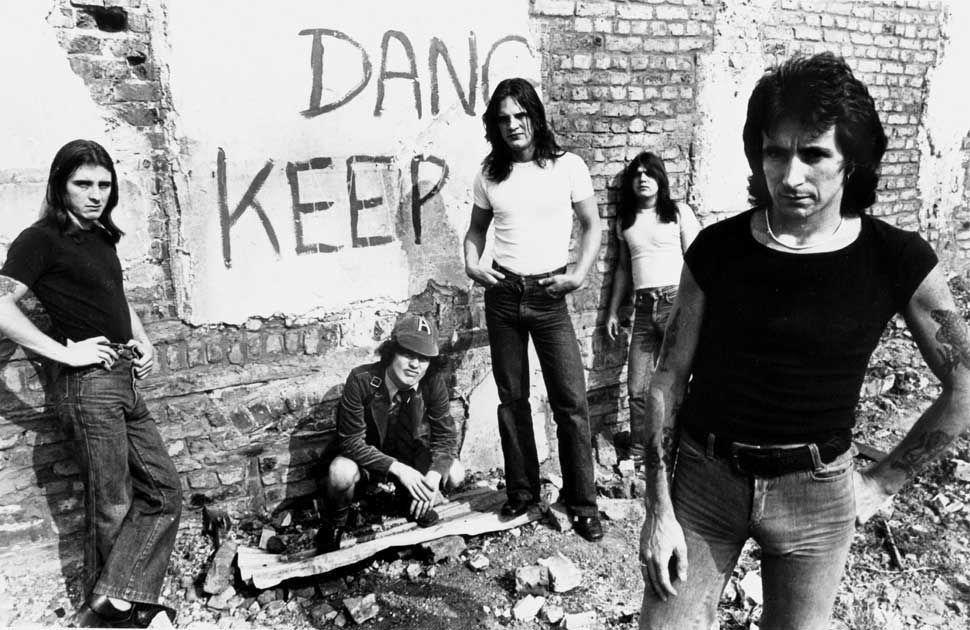
“The first thing that happened [after Bon’s death] was the TV and the VCR went missing from Bon and Joe’s house. People cleaned out the place. I said to Pete Way: ‘Fuck, one minute Bon’s here, the next he’s gone, and then his telly’s gone and whatever else he might have rented is gone’. It was like he got erased.”
So, to Classic Rock’s $64,000 question: obviously UFO were going through a major heroin period 25 years ago; it sounds as if dealers were here, there and everywhere. But when Bon’s death certificate was issued, it said the cause of death was ‘acute alcoholic poisoning’. “Yeah,” Chapman agrees. “And hypothermia.” (In fact, there was no mention of hypothermia.) The death certificate, we repeat, said drugs weren’t in Bon’s system.
Chapman: “I don’t think they were. I believe the reason Bon went to East Dulwich was he was going to get some smack. Maybe he couldn’t score at the Music Machine. I don’t know if it [the smack] was for us, or for us and him as well. I can never recall him being into that. He was just a hard drinker.”
But Bon also had a craving for sugar: “His teeth were rotten,” says Chapman. “He was always eating Mars Bars; AC/DC used to have Mars Bars on their tour rider. I’ve also seen Bon drink aftershave. Absolute truth. But I can never recall seeing him put anything in his mouth or up his nose; pills or smoking, nothing like that. But he drank like a wildman.”
Classic Rock urges Chapman to reiterate his comments, just to make sure there’s no doubt about what he’s saying. We ask: so regardless of the fact that Bon had all these people who were into smack around him, you say that he would’ve abstained from indulging?
“I… er… yeah. I can say that I never, ever remember seeing Bon take drugs. I might be wrong. Maybe I just wasn’t there at the time when he did. Or if he did. That whole thing was just a total, fucking baffling mess, it really was.
“How the fuck Bon got to Dulwich, I don’t know. I can’t believe they left him in the car. It was February; it was freezing cold. I had Calor Gas heaters in my flat and they were fucking cranking just to keep the place warm. And after all this went down I called Pete Way back and I said: ‘Can you believe they left Bon outside in the car?’ And Pete said: ‘Who the fuck would leave him in a car?’”
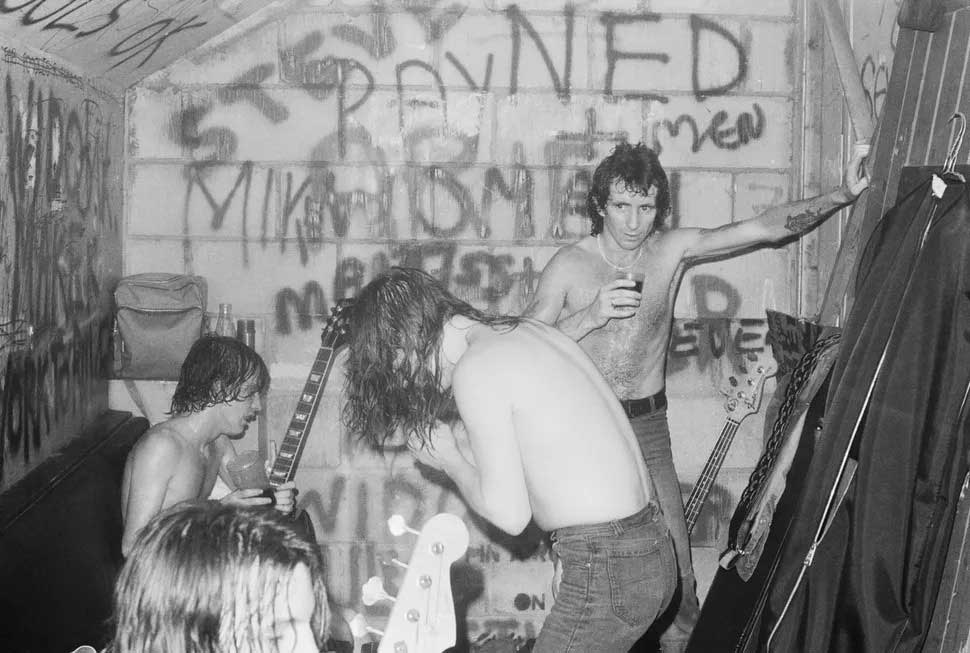
On the subject of heroin, Clinton Walker’s book adds: ‘If there’s ever been a suspicion Bon was more deeply involved in narcotics than it seemed, the fact is that he never really got into heroin. Certainly, though, he dabbled in it. On at least one occasion, in Melbourne in early 1975, he almost died of an overdose. But that, it seems, was enough to warn him off it, even though heroin would surround him… for the rest of his life.’
So, we asked Chapman, do you know who this Alistair Kinnear guy was?
“The name rings a bell” he replied. “Maybe it rings a bell from the reports. I never met him.”
How does Chapman think Joe King – who left Chapman’s flat in a drugged-out daze on the morning of Tuesday, February 19 – found out about Bon’s death so quickly, and ostensibly before Kinnear?
Chapman: “I don’t know. I have no clue. He [Joe] was a basket case on the phone. I’d just woken up. I think maybe the people that Bon went [to East Dulwich] with, whoever they were, maybe they might’ve had a phone number of where Bon was staying with Joe [in Victoria]. So they must’ve called Joe, and then Joe called me.
“Bon was found dead at five o’clock in the morning or something like that. Joe left my flat at seven and he called me at 10 or 11. He found out some time between those times. But I’ve no idea how.”
Classic Rock’s final words to Chapman are: so you’re saying that Bon would happily buy drugs for people, and then give them out.
“He wanted to stay up and party,” Chapman insists. “If that’s what kept us up, then he’d be up for it. Bon just wanted to keep the party going.”
Nothing is ever straightforward when a rock star dies. There’s always no end of conjecture and confusion. And many glaring anomalies and answered questions about Bon Scott’s death remain. Chief among them are:
● When was Bon’s body actually discovered? When did the police first find out? Classic Rock spoke to East Dulwich police station in Lordship Lane, who referred us to the Metropolitan Police press bureau. We were told that no information was available because Scott’s was a ‘non-suspicious death’. We then spoke to Southwark Coroner’s Court and asked if we could gain access to their records. We were told to submit a request in writing, which we did promptly. It was subsequently rejected. A spokesman told us: “Unfortunately you are not what we would call ‘a properly interested person’. That would be a parent, a spouse, a child or someone acting on behalf of the deceased.” He added: “There is still sensitivity surrounding this case.”
● Who is Alistair Kinnear, and why did he disappear from sight? We posed this question to Clinton Walker, Bon Scott’s biographer, who replied cryptically: “Alistair, I believe, was another guise used by one of the characters already in my book – and I did try to very gently imply that. I have met this fellow, but I’ve left it at that. What I’m saying is, I met the guy who might have been ‘Kinnear’, but that feeling is based on no real evidence, just a hunch.” Walker was unable to track down the ‘real’ Kinnear for his book.
● Alistair Kinnear – who some claim was a rock journalist, not a musician – may have changed his identity. The late writer Mark Putterford, who raised the issue of heroin being involved in Scott’s death, was reputedly aware of Kinnear’s new guise. A source told Classic Rock that, at the time of Putterford’s death 10 years ago, Putterford was planning to approach Kinnear with regard to doing an updated version of Shock To The System (Putterford’s AC/DC book that explores the heroin angle). One of the things that Putterford was planning to ask Kinnear was that if he was sober enough to drive across London, how come he was so inebriated that he slept solidly until the evening of Tuesday, February 19?

After Bon’s death, AC/DC closed ranks. Angus and Malcolm Young don’t often speak about their old singer, who was replaced by Brian Johnson for 1980’s Back In Black album. On the occasions when they do, their reminiscences are often anecdotal and humorous rather than heartfelt and emotional. That’s no criticism, it may be the best way they can find to deal with their grief.
Australian singer Jimmy Barnes, of Cold Chisel fame, recently told Classic Rock: “Nobody was more hurt than the AC/DC boys at the time, because they lost a great friend and a fine singer. A lesser band would have collapsed, but they came back and went on to make so many more huge records. Bon was an awful hard man to replace.”
Bruce Elder of the Sydney Morning Herald (formerly the London correspondent for Rolling Stone) spoke to Angus Young a few days after Bon’s death.
Elder asked: “Who in the band was closest to Bon?” Angus replied: “We all were. You see, we were on the road for 10 or 11 months every year, and the rest of the time we were in the studio recording the next album. We were all close to Bon.”
Elder concluded in his article: "It was one of those moments when you suddenly realise the line between truth and myth in the rock’n’roll lifestyle. These guys were bonded by hard work and the desire to succeed."
This tortured tale will continue to run and run, as it has done for the past 25 years. So let’s bring things to a temporary conclusion with a few words from Bon Scott, who once summed himself up with the classic quote: “They say to me: ‘Are you AC, or DC?’ And I say: ‘Neither, I’m the lightning!’”
And like a flash he was gone.
This feature origionally appeared in Classic Rock 76, published in February 2005.







